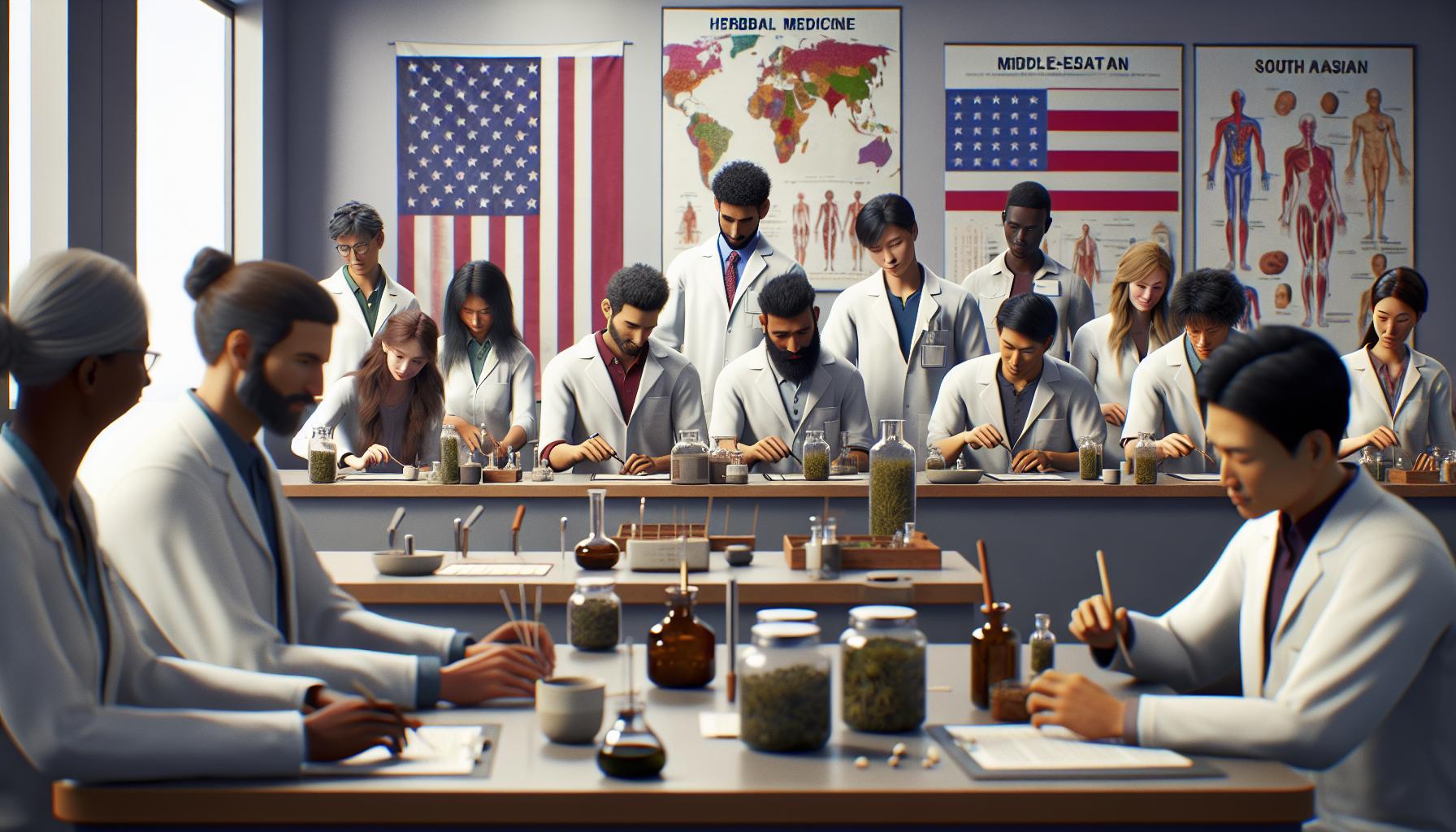In a world where stress levels are skyrocketing and traditional medicine sometimes feels like a game of whack-a-mole, alternative medicine is stepping into the spotlight. Imagine wielding the power of herbs, acupuncture needles, and ancient healing techniques, all while wearing a graduation cap. A master’s in alternative medicine isn’t just a degree; it’s a ticket to a holistic revolution.
With this advanced education, graduates can explore the fascinating realms of naturopathy, herbalism, and even energy healing. It’s not just about treating symptoms; it’s about nurturing the whole person. For those looking to blend science with a touch of mystique, this path offers a unique opportunity to make a real difference in people’s lives. So, if you’ve ever dreamed of being the go-to guru for wellness, now’s the time to dive into the world of alternative medicine.
Masters in Alternative Medicine
A master’s degree in alternative medicine provides in-depth education on holistic healing practices. Programs typically cover topics such as naturopathy, herbalism, acupuncture, and energy healing. Graduates gain proficiency in various modalities, allowing them to treat individuals comprehensively.
Courses often include in-depth studies of holistic health theories. Students explore the historical context of alternative practices while examining contemporary applications. Learning about plant-based medicine enables practitioners to utilize natural remedies effectively.
Institutions offering this degree often emphasize integrative approaches. By blending scientific research with alternative methodologies, graduates can develop unique treatment options. This synergy enhances their ability to care for patients seeking comprehensive health solutions.
Clinical training is a crucial component of these programs. Participants usually complete hands-on internships or practicums, allowing them to apply their knowledge in real-world settings. Experience gained during these training periods fosters confidence and competence when treating clients.
Furthermore, advanced studies in this field prepare graduates for diverse career paths. Options may include working in wellness centers, clinics, or private practices. They may also take on roles in health coaching, education, or research related to alternative therapies.
Networking opportunities often arise through programs. Connections with experienced professionals can lead to mentorship or job placements. A supportive community enhances the learning experience and professional growth.
Ultimately, pursuing a master’s in alternative medicine equips individuals to foster healing and wellness. As the demand for holistic approaches increases, graduates are well-positioned to make meaningful contributions to health care.
Types of Programs Available

Various programs are accessible for those interested in pursuing a master’s in alternative medicine, including online and on-campus options. Each format offers unique advantages that cater to different learning preferences and lifestyles.
Online vs. On-Campus
Online programs provide flexibility, allowing students to complete coursework from any location. They often include video lectures, discussion forums, and virtual labs that replicate hands-on experiences. On-campus programs deliver direct interaction with instructors and peers, promoting a collaborative learning environment. Students benefit from in-person workshops, practical training, and immediate access to resources. Both formats lead to robust education in alternative medicine, and prospective students choose based on personal schedules and learning styles.
Specializations Offered
Numerous specializations enhance a master’s in alternative medicine. Naturopathy focuses on natural therapies and holistic health. Herbalism emphasizes the knowledge and application of plant-based remedies. Acupuncture teaches the art of needle therapy for pain management and healing. Energy healing explores techniques like Reiki and sound therapy to promote emotional and physical well-being. Students often tailor their coursework to align with specific career goals, equipping them with diverse skills in the growing field of alternative medicine.
Curriculum and Coursework

Master’s programs in alternative medicine contain a unique curriculum designed to provide a comprehensive education. Coursework focuses on holistic healing practices, aiming to develop well-rounded practitioners.
Core Subjects
Courses cover essential topics such as anatomy, physiology, and nutrition. Holistic health theories provide a foundational understanding of alternative practices. Students study the historical context of various modalities, including traditional Chinese medicine and Ayurveda. Classes often include practical training in modalities like acupuncture and herbal medicine. Understanding ethical considerations and professional practice standards is crucial. Overall, core subjects prepare graduates for effective and ethical practice in the field of alternative medicine.
Elective Courses
Elective offerings enhance a student’s academic experience by allowing exploration of specialized interests. Options may include courses in clinical herbalism, holistic nutrition, or mind-body therapies. Advanced study in subjects like integrative health or energy psychology is often available. Tailoring education to align with personal career aspirations offers unique advantages. Opportunities for hands-on workshops and experiential learning exist in many programs. These electives cater to diverse learning styles, ensuring all students find enriching pathways in their education.
Benefits of Pursuing a Master’s Degree

Pursuing a master’s degree in alternative medicine offers numerous advantages. Graduates gain access to diverse career opportunities in holistic health fields.
Career Opportunities
Career paths often include roles in wellness centers, private practices, and holistic clinics. Positions as health coaches, educators, or researchers also become available. Graduates may find themselves working in integrative health teams, collaborating with conventional medical professionals. Exposure to real-world settings during internships enhances marketability in the job market. Additionally, specialized roles like acupuncture practitioner or clinical herbalist provide satisfying avenues for application of knowledge. Networking within programs fosters valuable professional connections, increasing prospects for mentorship and job placements.
Personal Growth and Knowledge
Personal growth occurs through comprehensive understanding of holistic health principles. Master’s programs instill a deeper awareness of the connections between body, mind, and spirit. Advanced studies in naturopathy or energy healing develop skills that empower individuals to promote well-being. Engaging with diverse perspectives in alternative medicine enhances critical thinking abilities. Students cultivate empathy and compassion, essential traits for effective healthcare practitioners. Continuous learning opportunities, including elective courses and experiential workshops, further enrich educational experiences. This profound knowledge equips graduates for meaningful contributions in healthcare and communities.
Potential Drawbacks
Pursuing a master’s in alternative medicine presents some potential drawbacks that aspirants should consider.
Cost of Education
Educational expenses can be significant. Tuition rates for master’s programs in alternative medicine often range from $15,000 to $50,000 annually. Additional fees for materials and clinical training contribute to overall costs as well. Many programs require extensive equipment or supplies, adding up quickly. Financial aid options exist, yet competition for scholarships can be intense. Balancing these costs with potential earnings in alternative medicine may lead to financial strain for graduates. Budgeting effectively before enrollment helps alleviate some of these concerns.
Job Market Considerations
The job market for alternative medicine practitioners varies widely. Demand for these professionals can fluctuate based on geographic location. In certain areas, holistic health practices see an increase in popularity, leading to more job openings. Nonetheless, others may experience limited opportunities due to misconceptions about alternative treatments. Licensing and certification requirements also differ by state, which can complicate entry into the field. Professionals should conduct market research to assess job availability and ensure they align education with realistic employment prospects.

